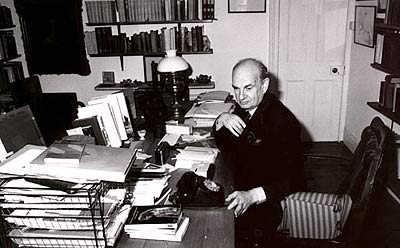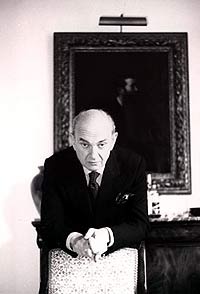 |
Richard Wollheim in his study. |
Richard Wollheim, professor emeritus and authority on art and psychoanalysis, dies
BERKELEY – Richard Arthur Wollheim, a University of California, Berkeley, professor emeritus of philosophy and an authority on psychoanalysis and art, died of heart failure on Tuesday (Nov. 4) at his London home. He was 80.
Wollheim coined the term "minimalism" in a 1965 essay titled, "Minimal Art," about painting that met minimal criteria for a work of art. Throughout his career he explored the differences art can make in psychological health or distress.
Author of more than a dozen books on issues relating to art and psychoanalysis, Wollheim's most influential volumes included "Art and its Objects," "The Mind and its Depths," and "Painting as an Art." He also wrote about Freud and penned a novel, "A Family Romance," about a man who poisons his wife.
"Richard Wollheim was one of the most important philosophers of art of the 20th century and, for all intents and purposes, an art historian in his own right," said Whitney Davis, chair of UC Berkeley's History of Art Department.
"'Art and its Objects,'" said, Davis, "remains one of the most succinct statements of a perspective on art widely endorsed by art historians, but never so well articulated by them...(It) will always have a central place in studies of visual representation and meaning."
 High-res images |
After World War II, Wollheim was appointed a lecturer at University College in London and stayed there until 1982. He headed its philosophy department from 1963 to 1983.
He taught at Columbia University in New York for three years, coming to UC Berkeley's College of Letters & Science in 1985. Wollheim split his time between UC Berkeley and UC Davis between 1989 and 1996. He was chair of the UC Berkeley Philosophy Department from 1998 until the fall of 2002. He had planned to return to teach in the current semester, after spending time with his daughter in England.
"He was very dedicated to art. It was his hobby and his profession," said Hans Sluga, a UC Berkeley philosophy professor. Wollheim was known to sit for hours in a gallery studying one painting. He told Sluga it was only after a couple of hours that he could really begin to understand a painting.
Sluga credited Wollheim with reviving the study of the philosophy of art in an era when philosophers tended to concentrate more on science and language.
Wollheim's students found him amiable and approachable, said Sluga, who also recalled Wollheim's "wicked English humor."
Wollheim was named a fellow of the British Academy in 1982 and of the American Academy of Arts and Sciences in 1986. He was president of the British Society of Aesthetics at the time of his death, and was a member of the faculty of the San Francisco Psychoanalytic Institute.
In recent years, he was the Luce Visiting Scholar at Yale's Humanities Center, the Gareth Evans Memorial Lecturer at Oxford, and the Roland Penrose Lecturer at the Tate Gallery in London.
Wollheim also had been a visiting scholar at the Getty Research Institute, which is dedicated to scholarship in the arts and humanities.
His presentations on personal identity as Harvard University's William James Lecturer in 1982 were later published as "The Thread of Life."
At UC Berkeley, Wollheim was invited to curate an exhibition at the Berkeley Art Museum & Pacific Film Archive of its renowned Hans Hofmann collection in 1999. He also participated in a public gallery talk at the museum with artist and friend Wayne Thiebaud - one of many between the two men over the years. In this program they discussed Hofmann's experimental methods of painting and his relationship to the early Abstract Expressionist school.
Senior curator Constance Lewallen recalled that Wollheim was invited to share his "wider philosophical perspective" on art. "We really counted on him as a great resource for a great many of our programs," she said.
Wollheim's first marriage, to Anne Powell, ended in divorce. In 1969, he married ceramist Mary Day Lanier, who said he was diagnosed in September with multiple myeloma.
His wife, twin sons Bruno and Rupert, and daughter Emilia survive him. All live in England. The family is planning a private funeral service. A public memorial will be held later.

